Search the Special Collections and Archives Portal
Search Results
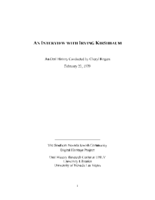
Transcript of interview with Irving Kirshbaum by Cheryl Rogers, February 23, 1979
Date
Archival Collection
Description
Interview with Irving Kirshbaum by Cheryl Rogers on February 23, 1979. In this interview, Kirshbaum discusses the Riviera Hotel where he began working in 1955. He also talks about the landscape of the Las Vegas Strip in the 1950s, and the state of gambling, comps, customer service, and dealer training. The interviewer asks about the treatment of minorities at the Riviera, and in Las Vegas generally, and the effect of corporate ownership on casinos.
Text

Transcript of interview with Gilbert D. Yarchever by Claytee White, 2006
Date
Archival Collection
Description
Gilbert Yarchever was one of nine siblings, born and bred in Pittsburgh, Pennsylvania. He describes the way his mother?s family was granted the last name of ?Kurfeersf" by Emperor Franz Joseph (of Austria-Hungary), explains the Seder (the Jewish observation of the exodus of Hebrews from Egypt), and tells what it was like to survive the Depression. Gilbert describes the jobs he held after high school and the government examination he took that led to his lifetime of adventure and travel. He moved to Washington, D.C., in 1940 and kept himself busy working for the government and taking classes at George Washington University, as well as working part time at Hecht Department Store and as a freelance court reporter. Following the attack on Pearl Harbor in 1941, Gilbert was sent to Africa on a merchant ship, helped smuggle Jewish survivors into Jerusalem, and was assigned the task of negotiating with Arab sheikhs for laborers to build a road. In the years after that, he worked in Europe, Panama, Alaska, Japan, and Hawaii and describes many of the jobs he was responsible for and many of the individuals he met. He also married and had children, kept up with university classes whenever he could, and collected art objects and paintings. Following his retirement in 1977, Gilbert and his family came to Las Vegas and bought a condo in Regency Towers. He did some consulting work for a couple of years, and then he and his wife began traveling around the states and going abroad. He was involved with UNLV?s EXCEL program, the music department, and the Las Vegas Art Museum. (He and his second wife Edythe presented the first major exhibition on Holocaust art at the museum.) These days Gilbert often donates pieces from his art collection to churches, synagogues, and charitable organizations.
Gilbert Yarchever was in the Navy during World War II, helped smuggle Jewish refugees into Jerusalem, worked as a civil servant in many countries, and moved to Las Vegas in 1977. He helped found the EXCEL program at University of Nevada, Las Vegas and was an art collector with his wife, Edythe Katz-Yarchever.
Text
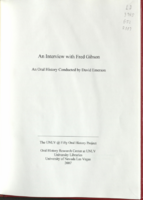
Transcript of interview with Fred Gibson by David Emerson, February 13, 2008
Date
Archival Collection
Description
Text

Transcript of interview with Dr. Leonard and Carol Raizen by Claytee D. White, April 8, 2009
Date
Archival Collection
Description
Leonard Raizin was born in Windsor, Ontario, Canada in 1930. His father was a cattle dealer. At an early age Raizin knew he wanted to be a doctor and after attending medical school he married his wife Carol Raizin born in Toronto, Canada. Leonard Raizin attended the University of Toronto for medical school in 1948. He met his wife Carol on a blind date. He started his internship at Sinai Hospital of Detroit in 1954. After a trip to Arizona and a feel of the desert weather the Raizins' with their four young daughters moved to Las Vegas, NV in 1961. When arriving in Las Vegas Dr. Raizin practiced at Southern Nevada Memorial Hospital (currently University Medical Center) and also at Sunrise as an anesthesiologist. There was a time while practicing in Las Vegas Dr. Raizin was the only anesthesiologist in the area, and experienced for the first 6 months of life in Las Vegas an extremely immersed schedule that never allowed him an entire night at home. Carol Raizin graduated as one of the first students at UNLV with a degree in Psychology in 1973. Carol eventually worked alongside her husband in their office handling bookkeeping for eight anesthesiologists. Dr. Leonard Raizin and Carol Raizin after a very successful life in Las Vegas are now retired. They still have a home in the Las Vegas area, however they spend their winters skiing in Park City, Utah and their summers fishing in Idaho.
Text
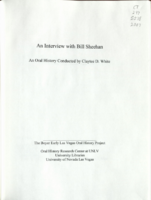
Transcript of interview with Bill Sheehan by Claytee White, July 1, 2009
Date
Archival Collection
Description
Bill Sheehan describes his Philadelphia, PA, upbringing: Catholic schooling, importance of education and growing up with numbers (his father was a bookie). Knowing he might be drafted, he joined the Marine Corps in the 1940s and then returned home to finish he studies to become an accountant. In 1959 he became a Certified Public Accountant (CPA). A short term job in California gave him a taste of the west. It was 1962, Las Vegas was growing and experiencing a shortage of qualified accountants. Bill applied for a CPA position and immediately was hired. Thus, began his permanent residency in Las Vegas. Bill talks about his professional life and how he eventually started his own firm in 1971. He retired in 1997. He also shares personal anecdotes, impressions and observations specifically about the growth of Henderson, Nevada, as it grew from a very small town adjacent to Las Vegas into a small city of over 200,000 people. Bill is a co-trustee, with Bob Clark, of the Boyer Charitable Foundation. This interview and many more are possible through the generous donation of the Boyers.
Text
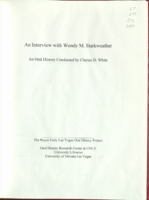
Transcript of interview with Wendy Starkweather by Claytee White, June 16, 2010
Date
Archival Collection
Description
Wendy Starkweather recalls her move to Las Vegas on a hot summer day in 1978. Her husband, Peter L. Starkweather had accepted a position to teach biology, but nothing had prepaied her for desert weather in July. She was a small town girl, born and raised in rural Ogdensburg, New York. She attended Skidmore College in Saratoga Springs, NY and became a teacher and librarian in New Hampshire Getting a job at UNLV's library took some time, but finally in 1985, she was offered the position of head of references. From that point on, there was only looking forward for Wendy. She was to be an active member of the library staff until her retirement in 2010. During her over two decades at UNLV she worked under the leadership of six deans. She was an vigorous voice in the development of services, impacting circulation, interlibrary loans and non-book services that included media and instruction. In addition, she was here during a momentous period as the future Lied Library was being fu
Text
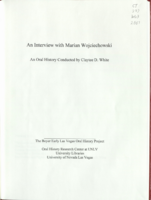
Transcript of interview with Marian Wojciechowski by Claytee White, June 16, 2009
Date
Archival Collection
Description
At age 95, Marian Wojciechowski recalls his personal story of being born a region called called Poland in 1914, just as World War I was beginning. This narrative gives special attention to his Polish background at a time when the country did not technically exist, and their language was forbidden. By the late 1930s and the dawning of World War II, Marian is a young man struggling to understand what is transpiring, but knowing that he must participate in the Polish underground resistance against the Germans His activism gets him arrested and sentenced to Auschwitz as a non-Jew and without penalty of death. He recalls the Gestapo beatings which have left him without feeling in his fingers and a loss of hearing. He shares historical perspectives of the war era, agricultural coops, goal of Germans to sell Jews to the United States and other countries, and a story about a woman who helped save 2500 Jewish children during war.
Text

William McCullough interview, February 26, 1979: transcript
Date
Archival Collection
Description
On February 26, 1979, collector Pete Wahlquist interviewed William McCullough (born May 9th, 1905 in Kansas City, Missouri) at his home in Boulder City, Nevada. In this interview, Mr. McCullough discusses moving to Nevada and working on the building of Hoover Dam (Boulder Dam). He also speaks about Boulder City during the time of building the dam, as well as the growth he has seen happen in Las Vegas, Nevada.
Text

Interview with David Browning Thomson, April 12, 2005
Date
Archival Collection
Description
Text

Interview with Peter Henry Zavattaro, May 31, 2005
Date
Archival Collection
Description
Text
